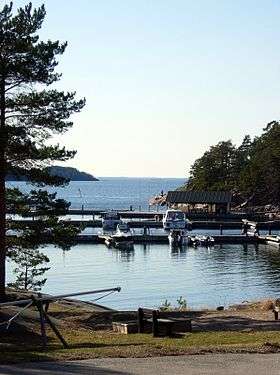Pargas (former municipality)
| Pargas Pargas – Parainen | ||
|---|---|---|
| Former town | ||
| Pargas stad Paraisten kaupunki | ||
|
| ||
| ||
 Location of Pargas in Finland | ||
| Coordinates: 60°18′N 022°18′E / 60.300°N 22.300°ECoordinates: 60°18′N 022°18′E / 60.300°N 22.300°E | ||
| Country | Finland | |
| Region | Southwest Finland | |
| Sub-region | Åboland | |
| Charter | 1948 | |
| Town privileges | 1977 | |
| Consolidated | 2009 | |
| Government | ||
| • City manager | Folke Öhman | |
| Area[1] | ||
| • Total | 476.73 km2 (184.07 sq mi) | |
| • Land | 273.18 km2 (105.48 sq mi) | |
| • Water | 203.55 km2 (78.59 sq mi) | |
| Population (2008-12-31)[2] | ||
| • Total | 12,266 | |
| • Density | 44.9/km2 (116/sq mi) | |
| Population by native language | ||
| • Finnish | 45% (official) | |
| • Swedish | 54% (official) | |
| Time zone | EET (UTC+2) | |
| • Summer (DST) | EEST (UTC+3) | |
Pargas (Swedish pronunciation: [ˈpɑrɡɑs]; Finnish: Parainen, pronounced [ˈpɑrɑinen]) is a former town and municipality in south-western Finland. On 1 January 2009, it was consolidated with Houtskär, Iniö, Korpo and Nagu to form the new town of Väståboland (since renamed to "Pargas").
It is known as the "capital" of the archipelago of Turku and had been called a town since 1977. It is located in the province of Western Finland and is part of the Southwest Finland region. The town had a population of 12,266 (as of 31 December 2008)[2] and covered a land area of 273.18 square kilometres (105.48 sq mi).[1] The population density was 44.9 inhabitants per square kilometre (116/sq mi).
The municipality was bilingual, with the majority (54%) being Swedish and the minority (45%) Finnish speakers.
The city has many little suburbs around it, including Kirjala and Lielax.

International relations
Twin towns — Sister cities
The sister cities of Pargas are
References
- 1 2 "Area by municipality as of 1 January 2008" (PDF) (in Finnish and Swedish). Land Survey of Finland. Retrieved 13 April 2010.
- 1 2 "Population by municipality as of 31 December 2008". Population Information System (in Finnish and Swedish). Population Register Center of Finland. Retrieved 20 January 2011.
External links
-
 Media related to Pargas at Wikimedia Commons
Media related to Pargas at Wikimedia Commons -
 Pargas travel guide from Wikivoyage
Pargas travel guide from Wikivoyage - Official website – in Swedish and Finnish

